|
|
|
Sort Order |
|
|
|
Items / Page
|
|
|
|
|
|
|
| Srl | Item |
| 1 |
ID:
132034
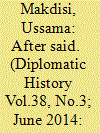

|
|
|
|
|
| Publication |
2014.
|
| Summary/Abstract |
The question of how to represent the U.S. role in the Middle East brings to the fore the question that Edward Said first raised in 1978 in Orientalism about the nature of American understandings of the Middle East. More than three decades after the publication of his book, Said's criticism of Orientalist scholarship-and his accompanying plea for a secular humanistic interpretation to replace it-remain both topical and enigmatic. It is one thing to criticize American representations of foreign cultures; it is an entirely different matter to study American engagements with them. These are by no means unrelated endeavors, but by the same token, they entail very different conceptions of what constitutes a field of inquiry and how to go about studying it comprehensively. The recent emergence of a more critical scholarship of America and the Middle East, therefore, begs the question of whether it is possible to write a history that takes both the Americans and Arabs equally seriously despite the prevailing political climate, and ultimately what kind of methodology this might entail for the rewriting of U.S.-Arab relations, and more broadly, American involvement in the world.
|
|
|
|
|
|
|
|
|
|
|
|
|
|
|
|
| 2 |
ID:
130241
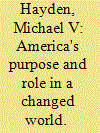

|
|
|
|
|
| Publication |
2014.
|
| Summary/Abstract |
I had never been a big fan of American exceptionalism. It was too self-referential, self-identifying, self-focused for my personal comfort. Then one bitterly cold day in February 1994, I was wandering through the open-air market in Sarajevo. The market had been hit by a single mortar round the previous weekend and sixty-eight people had been killed. Holes made by fragments from the 120-mm shell were still visible in the asphalt.
As I stared at the gouged surface in my battle dress and parka, Sarajevans began to come up to me, point to the small American flag on my upper sleeve, give a hesitant thumbs-up gesture, and whisper, almost prayerfully, "USA, USA."
Edward Snowden's leaks have fixated the media and the public on privacy and espionage, but the larger and more complex debate on protecting American security in the 21st century has been wanting.
At that point it became clear to me that it mattered less whether I thought America was exceptional. What mattered was that many people around the world thought that we were, and expected us to act accordingly. In many ways this is less something we have earned or even want, and more the product of historical circumstance. But a burden has clearly been ours, and when it is no longer ours the best judgment we can hope for is something along the lines of "As global hegemons go, these guys weren't bad." Now, under President Obama, the United States is involved in a redefinition or at least a recalibration of that exceptional role.
|
|
|
|
|
|
|
|
|
|
|
|
|
|
|
|
| 3 |
ID:
130242
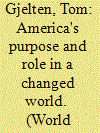

|
|
|
|
|
| Publication |
2014.
|
| Summary/Abstract |
The presidencies of George W. Bush and Barack Obama suggest what doesn't work in efforts to promote US influence in the world. By ordering an ill-conceived invasion of Iraq, Bush alienated US allies. His policies of secretly imprisoning Islamist militants and then subjecting them to "enhanced" interrogation and indefinite detention at Guantánamo struck Muslims everywhere as evidence of a war on Islam. Barack Obama, elected as the most explicitly anti-war president since Woodrow Wilson, came into office determined to undo the international damage done by his predecessor. "The walls between old allies on either side of the Atlantic cannot stand," Obama said in Berlin in 2008, and a year later, speaking in Cairo, he promised "a new beginning" with the Muslim world, with relations "based upon mutual interest and mutual respect." As promised, he withdrew US combat troops from Iraq. By 2013, however, Obama had fared little better than Bush in his global outreach. According to the Pew Research Center, support for the United States in Egypt, Jordan, Lebanon, and Pakistan was actually lower than it had been in the last year of the Bush administration. In Europe, the US favorability rating was higher than it was under Bush, but it had fallen steadily in the years since Obama took office, and it remained far below where it stood in 2000. One possible lesson from these years is that presidential personalities, speeches on foreign stages, and the changing international opinions of US policies matter less than we might think. Perhaps the most reliable measure of America's standing in the world is how appealing the country is to all those who are considering migration. Since 2007, Gallup surveys in more than one hundred and fifty countries have shown that the United States is far and away the number one favored destination. The most recent survey projected that one hundred and thirty-eight million people worldwide would like to move permanently to the United States, more than three times the number who would choose the United Kingdom, the second most favored destination. Those numbers show the United States still represents opportunity and promise to people around the world, and it is clearly in the US global interest to maintain that reputation.
|
|
|
|
|
|
|
|
|
|
|
|
|
|
|
|
| 4 |
ID:
130243
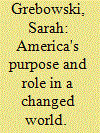

|
|
|
|
|
| Publication |
2014.
|
| Summary/Abstract |
I'll never forget my brief and ill-received show of American patriotism as a young expatriate in Beirut. It was the summer of 2010, and the city was teeming with convoys of Lebanese youth honking and waving flags to celebrate their favorite teams' victories in the World Cup. After an exciting win by the US, I joined a group of Americans in a street celebration. But cruising down the main thoroughfare of West Beirut, our procession of stars and stripes was met with disapproving looks. The image that remains with me to this day is that of an older man standing silently with his shoe in his hand. The tattered sole was pointed directly at us, an expression of disrespect in Muslim culture. We recognized the gesture's meaning only because a similar shoe had been thrown at the American president's head a year earlier.
Today's generation of young Americans, known as the millennials, has come of age at a time when America has been humbled on the world stage. Many of them have traveled extensively at a young age and experienced this diminished reputation firsthand. Their parents and grandparents believe that America has been a remarkable force for good in the world and that the country should not lose sight of its responsibility to shape events globally because of mistakes made in the last decade. But millennials seem more fixed on the limits of American power and disenchanted with ideas of American exceptionalism.
Because of these reservations, the millennial generation is often described as declinist or isolationist. I disagree. Young Americans care more than any other age group about what happens beyond our borders. Millennials tend toward multilateralism and the cautious use of force, and perhaps would be more selective in committing US resources overseas. But far from an abdication of global leadership, this prudence may prove to be the silver lining to millennials' crisis of confidence in America's role as, in President Obama's words, "not just a place on a map, but the light to the world."
|
|
|
|
|
|
|
|
|
|
|
|
|
|
|
|
| 5 |
ID:
109297
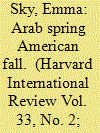

|
|
|
| 6 |
ID:
141545
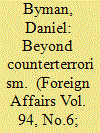

|
|
|
|
|
| Summary/Abstract |
When the Obama administration looks at the Middle East [2], it does so through the lens of counterterrorism. A systematic emphasis on the subject has underscored not just the administration’s relentless pursuit of al Qaeda and its new focus on the self-proclaimed Islamic State [3] (or ISIS) but also a wider swath of its foreign policy, from its drone campaign in northwestern Pakistan to its maintenance of the detention facility in Guantánamo Bay.
|
|
|
|
|
|
|
|
|
|
|
|
|
|
|
|
| 7 |
ID:
129799
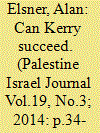

|
|
|
|
|
| Publication |
2014.
|
| Summary/Abstract |
During the many years of US Diplomacy in the Middle East, it has become a cliché to state that the United States cannot want peace more than the Israelis and Palestinians themselves.
|
|
|
|
|
|
|
|
|
|
|
|
|
|
|
|
| 8 |
ID:
087368
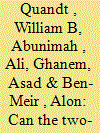

|
|
|
| 9 |
ID:
129801
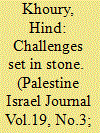

|
|
|
|
|
| Publication |
2014.
|
| Summary/Abstract |
What are the challenges to peace in 2014? The date is worth emphasizing, since attempts to broker peace in the Middle East are anything but new. In fact, the 1979 David Accords with Egypt are already 35 year old, and the Israeli-Palestinian peace process in entering its 23rd year. The process is growing stronger, but genuine peace is weakening by the day. In the meantime, there have been countless studies, articles, books, maps and reports addressing all aspects in the conflicts.
|
|
|
|
|
|
|
|
|
|
|
|
|
|
|
|
| 10 |
ID:
130607
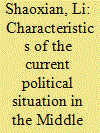

|
|
|
|
|
| Publication |
2014.
|
| Summary/Abstract |
By comparison with the "Arab Spring" that swept through the whole Bregion in 2011 and the political transition evident in many Arab countries in 2012, political development in the Middle East in 2013, to many observers, seemed lost in chaos. Arab countries undergoing political change were plagued by disorder, volatility, and violence. With US. strategic withdrawal from the region imminent, geopolitical dynamics
regrouped. Struggles among regional powers entered a new stage. Four characteristics of the Middle East situation are harbingers for future outcomes: political "ehaos" in the Arab world, "flux and reflux" between moderate and radical lslamists, geopolitical shocks caused by the strategic withdrawal of the U.S. from the region, and continued uncertainty over the Iranian nuclear issue.
|
|
|
|
|
|
|
|
|
|
|
|
|
|
|
|
| 11 |
ID:
128071
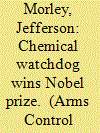

|
|
|
|
|
| Publication |
2013.
|
| Summary/Abstract |
The Organisation for the Prohibition of Chemical Weapons (OPCW) was awarded the Nobel Peace Prize on Oct. 11 for its efforts in eliminating the scourge of chemical warfare.
The honor boosted the Hague-based organization just 10 days after its personnel arrived in Syria on the most challenging mission of its 16-year history: dismantling the chemical arsenal of President Bashar al-Assad's besieged government.
In an Oct. 11 statement to the press, OPCW Director-General Ahmet Üzümcü, a former Turkish diplomat, said the OPCW operates "away from the glare of international publicity" while taking on the "onerous but noble task" of implementing the Chemical Weapons Convention, which took effect in 1997.
|
|
|
|
|
|
|
|
|
|
|
|
|
|
|
|
| 12 |
ID:
130608
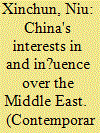

|
|
|
|
|
| Publication |
2014.
|
| Summary/Abstract |
The Middle East became a critical region for China after 1993, when The Beijing became a net oil importer. From this point, it became enmeshed in the complicated regional situation. And so China must realize its basic interests and policy objectives in the Middle East as well as set up an overall, balanced, clear and long-term strategic framework. Policy choices should be made in accordance with such factors as diplomatic tradition, national strength and political ideology
|
|
|
|
|
|
|
|
|
|
|
|
|
|
|
|
| 13 |
ID:
146060
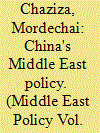

|
|
|
|
|
| Summary/Abstract |
Since the end of the Cold War, Chinese foreign policy in the Middle East has been primarily driven by a search for energy security and a desire to increase its overseas markets and investment opportunities.
|
|
|
|
|
|
|
|
|
|
|
|
|
|
|
|
| 14 |
ID:
132020
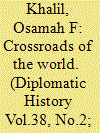

|
|
|
|
|
| Publication |
2014.
|
| Summary/Abstract |
In this paper, I argue that the "Middle East" is an ideational construct maintained by geographical, intellectual, and ideological representations. I assert that the geographical boundaries of the area called the Middle East have shifted over the past century to reflect the strategic interests of the major hegemonic power in the region, initially Britain and later the United States. Drawing on published and archival sources, I trace the etymology of the "Middle East" and its accompanying geographical representations and their relationship to key American and British foreign policy decisions and declarations. I also discuss how the Arabic translation of the "Middle East," or al-Sharq al-Awsa?, has been adopted and contested by scholars and journalists in the region.
|
|
|
|
|
|
|
|
|
|
|
|
|
|
|
|
| 15 |
ID:
134073
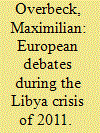

|
|
|
|
|
| Publication |
2014.
|
| Summary/Abstract |
The war in Libya of 2011 is generally portrayed as yet more evidence of the European Union (EU)'s inability to formulate a coordinated foreign policy. While the crisis took place in the EU's backyard, joint foreign policy action was hindered by member states' disagreements on whether or not to establish a no-fly zone in Libya. While this is true of political decision-makers, this paper investigates whether governmental decisions were reflected in similar divisions in national news media or whether references to European identity and criticism of European disunity transcended national media boundaries. Comparing a total of 6746 newspaper articles from Germany, France, the UK, Austria and the USA, the findings show that intergovernmental differences did not lead to similarly divided public spheres. Public debates in France, Germany and Austria constantly referred to a European foreign policy identity, though EU identity references were largely absent from UK newspapers.
|
|
|
|
|
|
|
|
|
|
|
|
|
|
|
|
| 16 |
ID:
128329
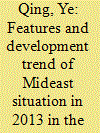

|
|
|
|
|
| Publication |
2013.
|
| Summary/Abstract |
The situation in Middle East is full of twists and turns in 2013, demonstrating a transitional character of the transformation of regional architecture. It has projected a certain extent of inheritance on the one hand and some tendencies for future development on the other. The adjustment of Mideast regional architecture will be shaped in the process of continuous rivalry between the new and old forces, the mutual adaptation of new and old modes and constant interaction between big powers and regional countries.
|
|
|
|
|
|
|
|
|
|
|
|
|
|
|
|
| 17 |
ID:
087016
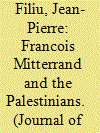

|
|
|
|
|
| Publication |
2009.
|
| Summary/Abstract |
François Mitterrand, the longest-serving French president in history, never ceased to be a passionate advocate of Israel, in contrast to his Gaullist predecessors. But he was also the most committed to Palestinian statehood, and among the earliest to insist on the PLO's full engagement in the peace process, often at considerable cost to his ties with Israel. By the time Mitterrand left office in 1995, France's Middle Eastern role had greatly declined, with the United States having assumed full control of the peace process; during the 1980s, however, its contributions had been significant. This article examines Mitterrand's fourteen-year presidency and the paradoxes of his Middle East policy.
|
|
|
|
|
|
|
|
|
|
|
|
|
|
|
|
| 18 |
ID:
128657
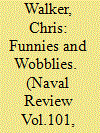

|
|
|
|
|
| Publication |
2013.
|
| Summary/Abstract |
Fost funnies are only funny to fost staff, which is why they do them. Originally they were to more than a bit of innocent merriment at the customer's expense, but both funnies and staff, mercifully, have matured a bit over the year. The ID card at the brow with Guy the Gorilla on it, or the Sheikh of Araby on the jetty with an embarrassed haremgirl, demanding hospitality in the middle of Distex, are new old hat.
|
|
|
|
|
|
|
|
|
|
|
|
|
|
|
|
| 19 |
ID:
062175
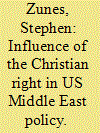

|
|
|
| 20 |
ID:
104677
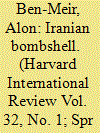

|
|
|
|
|
|
|
|